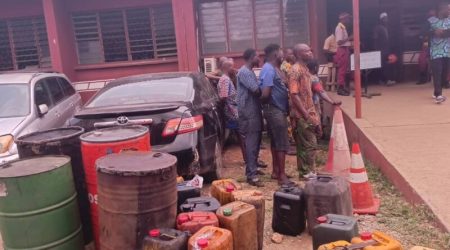The Nigerian oil and gas sector is experiencing a complex interplay between the need for specialized foreign expertise and the government’s push for increased local participation. While the Nigerian Content Development and Monitoring Board (NCDMB) approved 448 expatriate quota requests in the first half of 2025, signifying a continued reliance on foreign skills, this figure represents an 18% decrease compared to the previous year, indicating a tightening of regulations. This decrease aligns with the government’s ambition to raise local content participation to 70% from the current 56%, aiming to boost domestic job creation and value retention. The NCDMB also rejected 319 expatriate quota requests during the same period, further emphasizing the government’s commitment to prioritize local talent. This stricter approach to approving foreign workers reflects a shift towards ensuring that only essential foreign expertise is sought when local equivalents are unavailable.
The tension between employing foreign experts and promoting local content has led to disputes. A notable example is the clash between the Petroleum and Natural Gas Senior Staff Association of Nigeria (PENGASSAN) and Sterling Oil in March 2025. PENGASSAN accused Sterling Oil of violating local content regulations by employing a large number of foreign nationals, highlighting the potential for misuse of the expatriate quota system. The subsequent resolution, involving the disengagement of foreign workers and increased hiring of Nigerians, underscores the government’s commitment to upholding local content laws. This incident, however, also exposes the challenges in effectively regulating and monitoring the employment of foreign workers, especially given allegations of multiple government agencies issuing approvals independently.
The NCDMB plays a crucial role in navigating this complex landscape. The board is responsible for reviewing expatriate quota requests to ensure that such positions are filled by foreigners only when no suitably qualified Nigerian is available. The board’s stringent approval process, evidenced by the high number of rejected applications, demonstrates its commitment to prioritizing local talent. Furthermore, the NCDMB’s efforts to enforce the Nigerian Oil and Gas Industry Content Development Act (NOGICD) contribute to the overall goal of increasing local participation in the industry. The NCDMB emphasizes skill transfer programs, ensuring that foreign expertise contributes to the long-term development of Nigerian capacity.
The historical context of the Nigerian oil and gas industry highlights the significance of the current focus on local content. Before the NOGICD Act, Nigerian participation was minimal, leading to substantial capital flight and lost job opportunities. Conservative estimates suggest that Nigeria lost approximately $380 billion and over two million jobs in the first 50 years of oil production due to the reliance on foreign expertise and execution of projects abroad. The NCDMB’s work since 2010 has significantly increased local content to 56%, contributing to the creation of over 50,000 jobs and numerous training opportunities. The ongoing $5 billion Nigeria LNG Train 7 project, with 50% local execution and over 8,300 Nigerians employed, exemplifies the tangible benefits of the local content drive.
Recent presidential directives related to oil and gas projects have aimed to reinforce the objectives of the NOGICD Act. These directives, according to the Special Adviser to the President on Energy, Olu Verheijen, prioritize genuine value addition over rent-seeking. The focus is on supporting companies that invest in infrastructure, human capital development, and the employment of Nigerians. This clarification seeks to differentiate between companies genuinely committed to local content development and those merely seeking to exploit the system. By prioritizing companies with demonstrable investments in local capacity, the government aims to maximize the benefits of the oil and gas sector for the Nigerian economy.
The government’s commitment to increasing local content is not without its challenges. Balancing the need for specialized skills with the imperative of promoting local participation requires careful management. While foreign expertise remains important for certain roles, particularly in highly technical areas, the emphasis on developing local capacity is crucial for long-term economic growth and job creation. The ongoing efforts of the NCDMB, coupled with recent presidential directives, aim to strike this balance by ensuring that foreign involvement contributes to the development of a robust and sustainable Nigerian oil and gas industry while maximizing the benefits for the Nigerian people.














